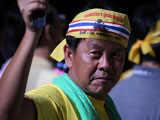True Colors: Thailand on the Brink
By Simon Roughneen for ISN
In scenes redolent of 1930s Europe, for over a year now color-coded political protesters have fought street battles and blockaded government buildings, amid a battle for control of Thailand's government. The upheaval - and the official reaction - took a turn for the worse over the past week, when the United Front for Democracy against Dictatorship (UDD) was driven from the streets by the Thai army following a violent confrontation in Bangkok.
Earlier, the UDD had breached a security cordon at an Asian regional summit due to be held at Pattaya, forcing the Japanese and Chinese prime ministers to flee by helicopter, and attacking Thai Prime Minister Abihisit Vejajjiva's car.
The incident marks dangerous portent for the near future in Thailand, which was unable to guarantee security for visiting dignitaries and officials. This is a huge international embarrassment for a country that prides itself on openness to visitors, a growing trade-oriented economy and relative stability compared with neighbors such as Indonesia and the Philippines.
And all during the Thai Buddhist Songkran New Year celebrations. Traditionally, Thais splash water on each other to mark the event, but this time, the water cannon was order of the day, as the security forces sought to clear protesters off the streets of Bangkok.
The Thai economy is heavily trade-dependent and more prone than others to the global recession. In total, around 70 percent of economic output is either trade-based or derived from tourism. The sight of red-clad hordes running amok in Bangkok, only months after their rivals laid siege to the country's main international airports, will mean a slow year for the vital tourist industry.
Exports are down as consumption in the US plummets, and political polarization will make it very difficult for any Thai government to effectively craft and implement policy in response.
Neither the yellow-hued royalist Peoples’ Alliance for Democracy (PAD), nor the UDD, supporters of ousted former PM and current exile Thaksin Shinawatra, see the other side as truly legitimate. With PAD supported by urban elites, supporters of the king, sections of the “liberal” media (despite the illiberal designs maintained by PAD ) and apparently the army and police, it would appear that PM Abhisit is safe for the time being.
The UDD, depending on the viewpoint, either capitulated in the face of unyielding force, or made a pragmatic decision to stand down after the Thai army locked down the streets of Bangkok on Monday and Tuesday. The UDD had over 100,000 people on the streets over the weekend, but by Tuesday, less than 2,000 die-hards remained after bloody clashes with the security forces.
The army reaction was belated, perhaps, and despite being urged by PAD to intervene, did not do so until the UDD had played its hand. However, what will be remembered is that the army did little to shift PAD from Thailand's airports last December, but did eventually use force on UDD.
Thaksin was removed from office in 2006, after losing favor with the elites now backing PAD. Still, his allies won elections in the meantime, prompting PAD to send its own supporters onto the streets in response during 2008. PAD finally got its way last November, when a number of parliamentary defections allowed Abhisit take over as prime minister, in place of the Thaksin proxy Somchai Wongsawat.
Questions remain over why Thaksin launched such adversarial brinkmanship, just at this time. He could not have seriously hoped to overthrow the PAD government, but may have sought to spark another military coup by making the army top brass think that the country is becoming ungovernable by democratic, civilian-led norms, and that emergency measures are needed in such an economically precarious time.
A coup would of course have to be followed by elections, at some point, and Thaksin could be reasonably confident of success, given recent election results.
The former tycoon may have been seeking a bargaining chip against the state, which has frozen over US$2 billion of his assets amid charges of corruption, and barred some of his allies from participation in politics for five years.
Finally, with King Bhumibol now 81, all of Thailand is looking to a successor. The veteran incumbent has manipulated and managed Thai politics since the nation became independent, and the person and institution of monarch remains at the center of Thai public life.
In recent days, Thaksin has made unprecedented statements attacking the royally appointed Privy Council, and by implication, the king as well. Thaksin alleged that the Council participated in the 2006 coup that drove him from office. The latest street violence may be a hint that, upon King Bhumibol's passing, the Communist-linked UDD may seek to undermine or even explicitly challenge the monarchy itself.
